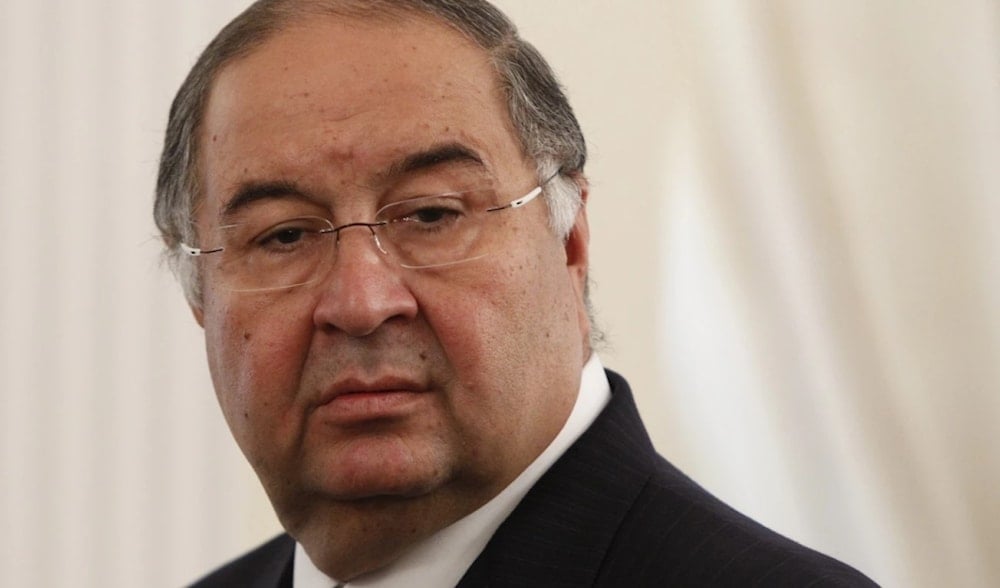Sanctions on Russia did more harm to EU economy: Russian billionaire
The billionaire described sanctions on individuals close to Russian leadership as “a colossal mistake” since “they do not influence decision-making."
-

Russian billionaire and entrepreneur Alisher Usmanovm, undated. (AFP)
Western sanctions imposed on Russia have yielded results opposite their intended goal, Russian billionaire Alisher Usmanov said in an interview with Italian newspaper Corriere Della Sera on Thursday.
The metals tycoon highlighted that the sanctions, which were imposed since the start of the Russian-Ukraine war in February 2022, have caused more harm to the European Union than to Moscow.
"They wanted to harm the Russian economy, and here it is growing. They wanted to punish the business elite, and the Russians brought the money back home. The Russian economy is adapting to the sanctions, while neighboring markets are suffering. Europe rejects Russian energy resources and is forced to buy them at a much higher price," Usmanov told the newspaper.
Despite economic sanctions implemented by Ukraine's Western allies, Russia’s economy expanded by 3.6% last year while Germany underwent a recession. Additionally, France and Italy had recorded an economic growth of under 1%.
The sanctions imposed in September 2022 on the Nord Stream pipeline led to a significant drop in Russian gas supplies to the EU, resulting in the bloc purchasing US liquified natural gas (LNG) which is estimated to be 30-40% more expensive.
Usmanov condemns Western sanctions on individuals
The Uzbekistan-born businessman condemned the sanctioning of targeted individuals deemed close to Russian leadership by the European Union, describing it as "a colossal mistake" since "they do not influence decision-making."
Since the start of the Russia-Ukraine conflict, Usmanov was added to the UK, US, and EU sanctions lists alongside several prominent business figures.
Essentially, these sanctions have restricted Russian investment internationally, forcing them to mainly invest at home.
"Sanctions are a sign of impotence," the businessman said, highlighting that peace in Ukraine can only be attained through compromise and negotiations.
Usmanov is among the world's 10 wealthiest people, according to Forbes, with a $13.8 billion net worth and stakeholdings in iron ore and steel corporation Metalloinvest and telecommunications firm MegaFon.
Russia's oil revenues on the rise in defiance of Western sanctions
Russia’s oil revenue exports surged by almost 50% in June 2024 compared to 2023 due to the country’s flagship Urals adaptation to Western sanctions, Bloomberg reported on July 3.
Back in June, Moscow's crude oil sales revenues saw a significant increase. Oil-related taxes reached 590.6 billion rubles ($6.7 billion), up from 402.8 billion rubles ($4.5 billion) in June 2023, according to Bloomberg’s calculations, based on the Russian Finance Ministry's financial data.
The figures revealed a 41% increase in the total oil and gas profits to 746.6 billion rubles ($8.4 billion), attributed to higher prices for Russia’s key export Urals blend. The ministry calculated June taxes based on the Urals price of $67.37 a barrel, up from $53.50 a year ago.
The imposition of a price cap and embargo on Russian oil by Western governments aimed to collapse the country’s economy, while also allowing Russian crude oil to flow into the international markets.
Russia retaliated to the West’s sanctions by redirecting most of its energy exports to Asia, selling well above the imposed price cap, primarily in India and China.
The financial report also revealed that budget revenues from Russia's oil and gas sectors experienced a remarkable surge of 73.5% from January to May this year, compared to the first five months of 2023. The generated profit from oil and gas sales during this period totaled 4.95 trillion rubles ($55.7 billion), and it is expected to reach 10.99 trillion rubles ($125 billion) this year.

 4 Min Read
4 Min Read









